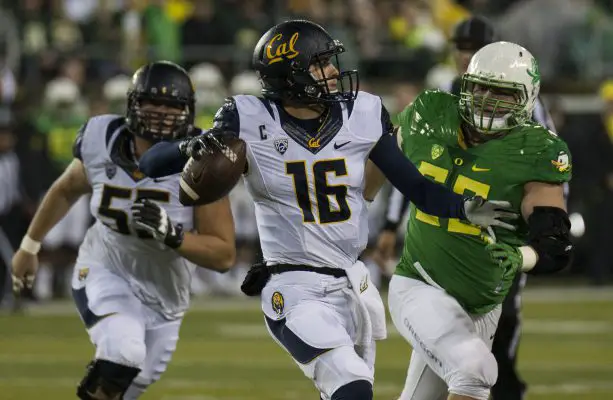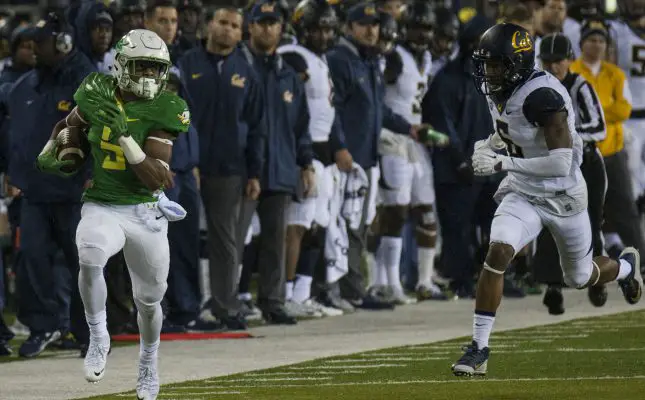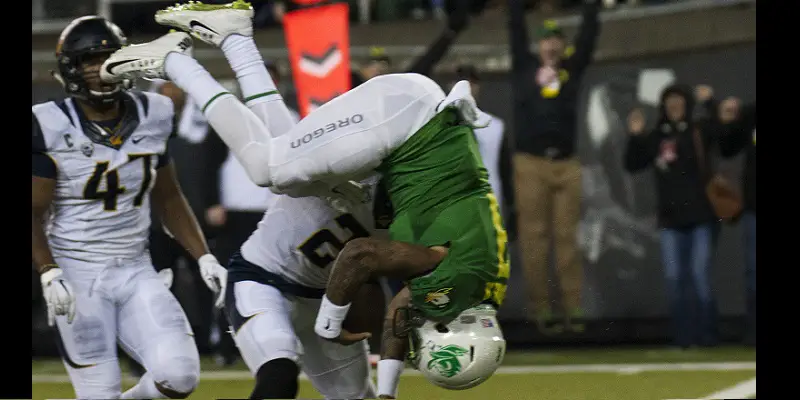Well that escalated quickly.
After giving up 10 quick points and an end zone interception to start the game, the Oregon Ducks exploded for 31 straight points before halftime, while stuffing Cal’s potent offense en route to a 44-28 win. The game was not nearly as close as the final score would suggest; it was 31-10 at the break.
The Ducks run attack was ridiculous: 477 yards on the ground alone, versus a measly 300 in the air. Oregon ripped off long run after long run, with seven carries more than 15 yards just in the first half.
Four different running backs had individual runs of more than 25 yards (Royce Freeman, Kani Benoit, Tony Brooks-James and Taj Griffin). One drive started with three 15+ yard carries in a row before a 28-yard pass finished it off in four plays.
Cal’s coach Sonny Dykes knows exactly what the problem was.
“We tackled, very poorly. We probably missed, I’d estimate, 50 plus tackles. … We had guys in position all night to make plays, and we just dove at people’s feet all night.”
He also gave credit to Oregon’s skill players. (Freeman ran for 182 yards by himself, while Benoit and Brooks-James added 94 and 101 yards respectively.)
“They’re good running backs. They’re explosive players and they’ve got good speed. I thought the quarterback [Vernon Adams] played well today. You know it’s his first year in the program and he gets better every week. I thought he played well against Arizona State and he built on that tonight. He played really well tonight.”
In contrast, the Bears’ star quarterback Jared Goff — touted as the likely first quarterback to be taken in next spring’s NFL draft — had a rough night (18-41 for 329 yards, 2 TDs and an interception). Why? Goff said:
“I think it really just comes down to we didn’t make plays. I wasn’t throwing them where they need to be, we weren’t catching every ball, we weren’t making good blocks, we weren’t running the ball very well. It was all around. Everyone including myself could have been better.”

Cal QB Jared Goff felt the heat on a chilly night.
Goff had several passes — often low bullets — that appeared to bounce off of receivers’ hands. Coach Sonny Dykes thought Goff and the receivers shared responsibility for that.
“I didn’t think Jared was as accurate at times as maybe he’s been this season, and I think just as a group, our offense was a little shaky.
“When you’ve got a chance to make big plays, you’ve got to catch those balls.
“I’m pretty sure [all of] our receivers dropped some balls tonight. I mean, people will talk about the weather but it didn’t have anything to do with the weather. It was just a matter of going out and making those plays. You just can’t make those drops in those critical situations.”
Several of the Bears denied that the steady rain affected their play, but two years ago Dykes pulled Goff — then a rookie — from the 2013 Ducks game because heavy rain make it hard for him to grip the ball.
Oregon’s secondary also played very well after a rough start to the year. Arrion Springs and Tyree Robinson, in particular, broke up play after play. Goff told FishDuck he didn’t think the Ducks were doing anything different in their coverages; they just played well.
“They didn’t run anything we didn’t expect. I was pretty comfortable out there with everything thing they were running. I had a good pre-snap on everything. Coming out of that, we knew what they were doing — they did it all on film. They played good man outside on our receivers, they manned them up pretty well.”

Oregon ran away with the game.
Tight end Stephen Anderson, however, saw an adjustment by Oregon that disrupted California’s passing game.
“They dropped a lot of people [into deep coverage], and that’s why toward the beginning of the game we ran a lot of underneath routes and moved down the field, and we had those and we were hitting it.
“But we then had that drive and it sputtered out and the drive stalled. I think we should have recognized it on the sidelines and said ‘OK, they’re dropping a whole bunch so we should just hit those underneath routes and move downfield’ but we just weren’t doing that today.”
The biggest flaw in Oregon’s otherwise strong game was the punt protection unit. Cal blocked two of Oregon’s punts, though each crept forward a little — for a total 2.5 net yards per punt.
Then again, Oregon only had to punt twice, which was clearly the more important statistic.
Featured photo by Gary Breedlove
Related Articles:
Mark Saltveit’s newest book is “Controlled Chaos: Chip Kelly’s Football Revolution” (Diversion Books, NY) has been recently released. He is the author of “The Tao of Chip Kelly” (2013) and writes on science, religion, wordplay and political scandals. He is also a standup comedian and the world palindrome champion.

